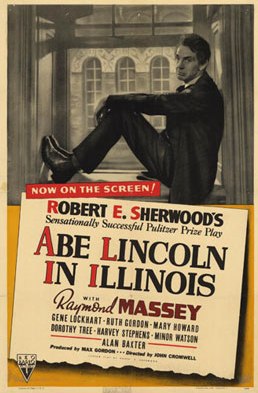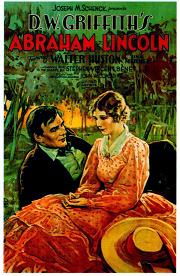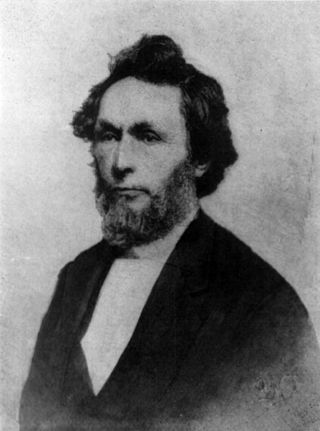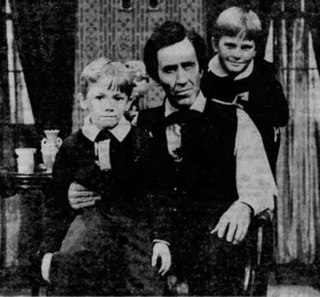Related Research Articles

Abe Lincoln in Illinois is a 1940 biographical-drama film that depicts the life of Abraham Lincoln from his departure from Kentucky until his election as president of the United States. In the UK, the film is known by the alternate title Spirit of the People. The film was adapted by Grover Jones and Robert E. Sherwood from Sherwood's 1938 Pulitzer Prize-winning play of the same name. It was directed by John Cromwell.

Ward Hill Lamon was a personal friend and self-appointed bodyguard of U.S. President Abraham Lincoln. Lamon was famously absent the night Lincoln was assassinated at Ford's Theatre on April 14, 1865, having been sent by Lincoln to Richmond, Virginia.

John George Nicolay was a German-born American author and diplomat who served as private secretary to U.S. President Abraham Lincoln and later co-authored Abraham Lincoln: A History, a ten-volume biography of the 16th president. He was a member of the German branch of the Nicolay family.

Abraham Lincoln, also released under the title D. W. Griffith's "Abraham Lincoln", is a 1930 pre-Code American biographical film about Abraham Lincoln directed by D. W. Griffith. It stars Walter Huston as Lincoln and Una Merkel, in her second speaking role, as Ann Rutledge. The script was co-written by Stephen Vincent Benét, author of the Civil War prose poem John Brown's Body (1928), and Gerrit Lloyd. This was the first of only two sound films made by Griffith.

David Herbert Donald was an American historian, best known for his 1995 biography of Abraham Lincoln. He twice won the Pulitzer Prize for Biography for earlier works; he published more than 30 books on United States political and literary figures and the history of the American South.
The sexuality of Abraham Lincoln has been the topic of historical speculation and research. No such discussions have been documented during or shortly after Lincoln's lifetime; however, in recent decades, some writers have discussed purported evidence that he may have been homosexual.

William Henry Herndon was a law partner and biographer of President Abraham Lincoln. He was an early member of the new Republican Party and was elected mayor of Springfield, Illinois.

Ann Mayes Rutledge was allegedly Abraham Lincoln's first love.

Joshua Fry Speed was an American planter and businessman. He was a close friend of future President Abraham Lincoln from his days in Springfield, Illinois, where Speed was a partner in a general store. He first met Lincoln in 1837. Later, Speed was a farmer and a real estate investor in Kentucky, and also served one term in the Kentucky House of Representatives in 1848.
Nancy Hanks Lincoln was the mother of U.S. President Abraham Lincoln. Her marriage to Thomas Lincoln also produced a daughter, Sarah, and a son, Thomas Jr. When Nancy and Thomas had been married for just over 10 years, the family moved from Kentucky to western Perry County, Indiana, in 1816. When Spencer County was formed in 1818, the Lincoln Homestead lay within its current boundaries. Nancy Lincoln died from milk sickness or consumption in 1818 at the Little Pigeon Creek Community in Spencer County when Abraham was nine years old.
Mordecai Lincoln was an uncle of U.S. President Abraham Lincoln. He was the eldest son of Captain Abraham Lincoln, a brother of Thomas Lincoln and Mary Lincoln Crume, and the husband of Mary Mudd. He is buried at the Old Catholic or Lincoln Cemetery near Fountain Green, Illinois.

Abraham Lincoln was born on February 12, 1809, in a one-room log cabin on the Sinking Spring farm, south of Hodgenville in Hardin County, Kentucky. His siblings were Sarah Lincoln Grigsby and Thomas Lincoln, Jr. After a land title dispute forced the family to leave in 1811, they relocated to Knob Creek farm, eight miles to the north. By 1814, Thomas Lincoln, Abraham's father, had lost most of his land in Kentucky in legal disputes over land titles. In 1816, Thomas and Nancy Lincoln, their nine-year-old daughter Sarah, and seven-year-old Abraham moved to what became Indiana, where they settled in Hurricane Township, Perry County, Indiana.

Abraham Lincoln grew up in a highly religious Baptist family. He never joined any Church, and was a skeptic as a young man and sometimes ridiculed revivalists. He frequently referred to God and had a deep knowledge of the Bible, often quoting it. Lincoln attended Protestant church services with his wife and children. "Especially after the death of his young son Willie in 1862, Lincoln moved away from his earlier religious skepticism." Some argue that Lincoln was neither a Christian believer nor a secular freethinker.
The poetry of Abraham Lincoln has been an interesting source into Lincoln's psyche. In addition to two complete, narrative poems, Lincoln wrote several small verses throughout his life and possibly a poem in the form of a suicide note.
This bibliography of Abraham Lincoln is a comprehensive list of written and published works about or by Abraham Lincoln, the 16th president of the United States. In terms of primary sources containing Lincoln's letters and writings, scholars rely on The Collected Works of Abraham Lincoln, edited by Roy Basler, and others. It only includes writings by Lincoln, and omits incoming correspondence. In the six decades since Basler completed his work, some new documents written by Lincoln have been discovered. Previously, a project was underway at the Papers of Abraham Lincoln to provide "a freely accessible comprehensive electronic edition of documents written by and to Abraham Lincoln". The Papers of Abraham Lincoln completed Series I of their project The Law Practice of Abraham Lincoln in 2000. They electronically launched The Law Practice of Abraham Lincoln, Second Edition in 2009, and published a selective print edition of this series. Attempts are still being made to transcribe documents for Series II and Series III.
Abraham Lincoln's health has been the subject of both contemporaneous commentary and subsequent hypotheses by historians and scholars. Until middle age, his health was fairly good for the time. He contracted malaria in 1830 and 1835; the latter was the worse of the two cases. He contracted smallpox in 1863 during an 1863 to 1864 epidemic in Washington, D.C.

Abraham Lincoln: A History is an 1890 ten-volume account of the life and times of Abraham Lincoln, written by John Nicolay and John Hay, who were his personal secretaries during the American Civil War.

"Abe Lincoln in Illinois" was an American television play broadcast on NBC on February 5, 1964, as part of the television series, Hallmark Hall of Fame. It was adapted from Robert E. Sherwood's 1938 Pulitzer Prize-winning play. Jason Robards was nominated for an Emmy as outstanding single performance by an actor in a leading role for his portrayal of Lincoln.

The Association of Lincoln Presenters is a membership organization founded by Dan Bassuk in 1990. It was established as a members' society for impersonators of 16th president of the United States, Abraham Lincoln. The group has been the subject of a feature-length documentary and a photography exhibition by Greta Pratt.
Achilles Morris was an American politician and military officer who served as Abraham Lincoln's commanding officer in 1832 during the Black Hawk War and defeated Lincoln in the Illinois House of Representatives election for Sangamon County the same year. Seven years later in 1839 Morris served as the Vice President of the Democratic-Republican Party of Illinois, and in 1840, Lincoln authored a bill for an Act to Establish a State Road from Petersburg in Menard County to Waverly in Morgan County where he appointed Achilles Morris as Commissioner. Morris later served alongside Lincoln at the Railroad Convention in 1845. The chairman of the convention was Samuel H. Treat, and the delegates elected were Nathaniel Pope, David J. Baker, John J. Hardin, Josiah Lamborn, Thomas Lewis, Abraham Lincoln, and Achilles Morris. Morris was a Jacksonian democrat.
References
- 1 2 3 Shenk, Joshua Wolf (June 6, 2004). "The Suicide Poem". The New Yorker. Retrieved 2023-02-17.
- ↑ "The Suicide's Soliloquy". Sangamo Journal: 2. 1838 – via Illinois Digital Newspaper Collections.
- 1 2 ""The Suicide's Soliloquy" by Abraham Lincoln – Shenandoah" . Retrieved 2020-10-27.
- ↑ Shenk, Joshua Wolf (October 2005). "Lincoln's Great Depression". The Atlantic. Retrieved 2017-05-30.
- ↑ Siegel, Robert (October 26, 2005). "Exploring Abraham Lincoln's 'Melancholy'".